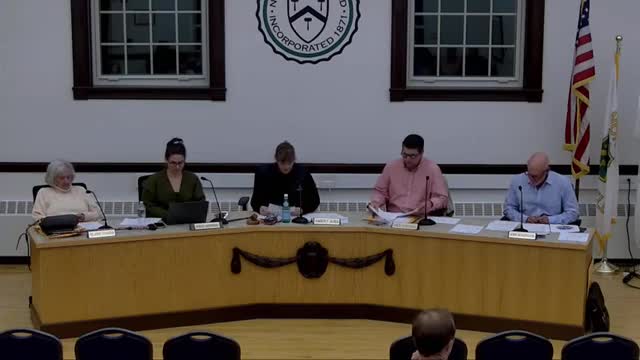North Smithfield opens public hearing on three-year police contract; hearing continued to Nov. 3
Get AI-powered insights, summaries, and transcripts
Subscribe
Summary
The North Smithfield Town Council opened a public hearing Monday on a proposed 2025–2028 collective bargaining agreement with the International Brotherhood of Police Officers and continued the hearing to Nov. 3 to allow the budget committee to complete a formal fiscal impact statement.
The North Smithfield Town Council opened a public hearing Monday on a proposed 2025–2028 collective bargaining agreement with the International Brotherhood of Police Officers and continued the hearing to Nov. 3 to allow the budget committee to finish a formal fiscal impact statement.
Town Administrator David Gibb presented the agreement’s principal terms and said the contract includes a new, substantially expanded management‑rights clause and changes intended to reduce arbitration costs tied to injured‑on‑duty claims. "We now have a clause that is very detailed in terms of the scope and breadth of management rights," said Vincent Regosti, the town solicitor, describing provisions that enumerate hiring, suspension, promotion, scheduling and other managerial prerogatives.
The contract includes a one‑time "catch‑up" increase for longer‑tenured officers and a 3.5% cost‑of‑living adjustment, followed by 3.5% increases in years two and three. Tony (finance staff) presented estimated budget effects and Michael Davis, speaking as an individual member of the budget committee, summarized his preliminary analysis: he estimated cumulative additional personnel costs of about $1,360,000 across three years, with year‑one cost around $256,000 and a per‑homeowner tax impact he calculated at roughly $44 in year one, $79 in year two and $108 by year three.
Police officials and several residents urged councilors to approve the increases to reduce turnover. "We lose officers to other departments primarily for financial reasons," the Police Chief said, describing higher turnover in the one‑to‑five years of service range. Public commenter Mike Clifford urged the council to resolve salary competitiveness to preserve public safety; retired law enforcement officer Bob Gillette said officers "earn their money" and described the physical and emotional demands of policing.
Councilors and staff clarified process and timing. The town solicitor and the council’s solicitor reiterated that, under the town charter and collective bargaining procedure, the council may not vote on the contract until at least two weeks after the public hearing and after the budget committee files its formal impact statement with the clerk. At the meeting councilors voted to open the hearing and later voted to continue it to a specified Nov. 3 date so the budget committee can complete and submit its recommendation.
Why it matters: the contract would raise compensation and change work‑rule language for the police department, with direct effects on payroll, overtime and the municipal budget. Councilors repeatedly framed the proposed increases as an effort to reduce turnover among early‑career officers and to align pay with comparable Rhode Island towns.
What councilors emphasized: town officials said the agreement contains provisions intended to lower the town’s arbitration risk (a medical arbitrating physician, or MAP, process for disputed injured‑on‑duty claims) and stricter sick‑leave verification tied to functional impairment rather than symptom reporting. Staff said the agreement retains an accreditation stipend for qualifying officers and that raises will have ripple effects on FICA, pensions and other payroll‑related costs.
Public comment and next steps: multiple residents spoke in favor of higher pay to reduce attrition and the town’s overtime burden. The council accepted public comment, then voted to continue the public hearing to Nov. 3 and requested that the budget committee deliver its formal fiscal impact statement to the clerk’s office at least one week before the next meeting where the council may vote.
Provenance: The hearing was opened and discussed in the council’s agenda item beginning at the council transcript timestamp where the collective bargaining item was introduced; the council’s vote to continue the hearing and related public comments appear later in the same topic block.
